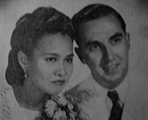




|
William
Pomeroy
(1916-2009)  American communist who
served in the amerikan army in the pacific during WWII and was
with the amerikan forces which (re)occupied the Philippines.
Pomeroy was a writer for the army historical unit during the
war and had contact with the Huks (Filipino communist
resistance fighters). Among other things, he was responsible
for delivering printing materials to them, which is how he met
his future wife Celia, a Huk guerrilla. Throughout the
war, even before the landing of the amerikans, the Huks were
attacked by small "guerrilla" groups working under the
authority of the amerikans, and after the amerikan invasion
the repression against the Huks was intensified. Pomeroy
saw this colonial repression of a (fellow communist) group
which was fighting a common enemy and was disgusted with it.
After the war when he was discharged he decided to stay in the
Philippines, where he taught for several years while involved
clandestinely with Filipino communists and participating in
underground work for the Hukbalahap with his Filipina wife
Celia Mariano whom he married in 1948. In 1950 he and Celia
joined the Hukbalahap in the forests, were they stayed two
years until their capture by government forces in 1952.
Released from prison in 1962, his wife was refused an amerikan
visa, and it took an international lobbying campaign to
reunite the revolutionary couple. Celia eventually was given a
British visa and they spent the rest of their lives together
in England. Politically he was very much a product of his
early years in the CP (he joined it in the 1930's). He
remained an intelligent, principled progressive until his
death.
The
Forest (1963): 220 pages. About the post-WWII armed
struggle of the communist Filipino resistance group Hukbalahap
(aka Huk) against the puppet Filipino government. A government
that was filled with people who were colonial officials during
the period of amerikan occupation and with fascist
collaborators. The Hukbalahap was originally formed on 29 March
1942, shortly after the japanese occupation of the Philippines
and the start of the mass repression that the japanese carried
out routinely in it's occupied territories. Created as an armed
resistance organization to the japanese fascists, it was
composed of communists, socialists, trade unionists, peasants,
and workers. In 1946 the amerikans granted "independence" to the
Philippines (which was "given" to the regime of Manuel Roxas, a
notorious collaborator under the japanese who was rehabilitated
by the amerikans to carry out their orders). Under the initial
amerikan occupation and the regime of Roxas, former Huks (who
had halted the armed struggle after the war hoping to be able to
restart their pre-war legal political organizations) were
murdered outright by the amerikans and the Filipino
constabulary, police, and military. Often when former Huks
accepted giving up their arms and registering with the
authorities they would be imprisoned or killed outright, and
several leading figures were assassinated. Thus the Huks decided
to restart their armed struggle, this time against the puppet
Filipino government. Pomeroy worked for several years in the Huk
underground in Manila while teaching at a university, and moved
into the forest in 1950 to take an active part in the Huk
struggle. This book details Pomeroy and his wife's work with the
Huk in the forests of Luzon, and ends with their capture and
imprisonment by the Filipino government in 1952 towards the very
end of the Huk uprising.
Born of the People, memoir of Luis Taruc (1949): 282 pages. Luis Taruc (1913-2005) was a communist leader involved in the socialist movement in the Philippines from before WWII, who continued his activity during the war with the communist Hukbalahap resistance group. He was still a leader in the Communist Party when it decided to restart the armed struggle, and he continued with the Huks until 1954 when he sold out, betrayed his comrades and surrendered to the government. This book was not written by Taruc, but by Pomeroy, who had planned to write a book based on the history of the Hukbalahap, and this eventually took the form of a ghost-written autobiography which documented the history of the communist movement in the Philippines up till that point. Its best read in this fashion: as a history and not an autobiography. |